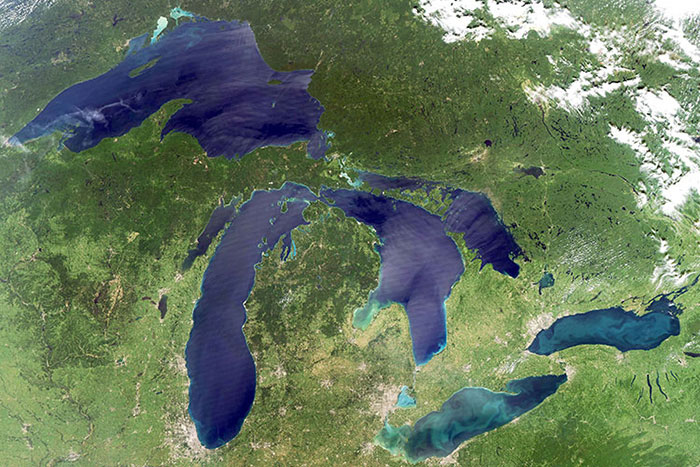Eighty-five per cent of respondents believe protecting the Great Lakes is highly important, according to one of the largest surveys ever conducted on public perception of the world’s largest freshwater system in both Canada and the United States.
The International Joint Commission (IJC) sponsored the survey, which was completed by its Great Lakes Water Quality Board in late 2015 and is summarized in the report released today.
“This survey of almost 4,000 basin residents is one of the largest ever conducted, and provides a valuable picture of how the public perceives the Great Lakes, including key environmental issues and threats, as well as opportunities,” said David Ullrich, the United States co-chair of the IJC’s Great Lakes Water Quality Board.
The survey showed that:
- A large majority of residents believe the Great Lakes should be protected for the benefit of fish and wildlife (76 per cent) as well as their economic significance to the region (76 per cent), their importance to human health now and for future generations (73 per cent), and as a valuable natural resource (53 per cent).
- An even higher 86 per cent feel it is important to protect the lakes for recreational purposes, even if they personally do not use them. More than 40 per cent of those who had used the lakes for recreational purposes had enjoyed boating, swimming, fishing, or another recreational activity in the lakes in the six months prior to the poll being conducted.
- 85 per cent feel it is essential to protect the Great Lakes from a variety of threats, including pollution and aquatic invasive species.
- While most believe all sectors of society can play a role in these efforts, 25 per cent and 20 per cent list federal and state/provincial governments, respectively, as responsible for the lakes’ health.
- The role of individual responsibility for protecting the health of the lakes is cited by 78 per cent of respondents, although 30 per cent are unsure what steps they can take.
- A large majority, 74 per cent, feel it is important that an organization like the IJC exists to facilitate cooperation in the Canada and the United States on issues impacting the Great Lakes, and to ensure that the goals and programs outlined in the Great Lakes Water Quality Agreement are accomplished.
“This survey provides a valuable tool to the International Joint Commission as we further our mission to help both countries develop collaborative strategies to protect the Great Lakes, to address environmental concerns, and to provide for the health of this resource for future generations,” said Rob de Loë, Canadian co-chair of the IJC’s Great Lakes Water Quality Board.
A total of 3,950 interviews were completed between November 16 and December 3, 2015.
The IJC’s Great Lakes Water Quality Board will host a panel discussion on the poll’s findings on Monday, April 18 at 7 p.m. that will be broadcast via Periscope. Check the IJC’s Twitter feed @IJCsharedwaters on Monday afternoon for the link.











